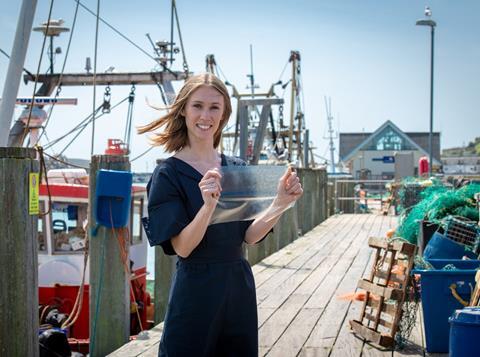
This year’s UK national James Dyson Award winner, 23-year-old Lucy Hughes from the University of Sussex, attempts to solve the problem of both single-use plastics and inefficient waste streams by harnessing fish offcuts to create a plastic alternative, MarinaTex.
MarinaTex is a bioplastic made of organic fish waste ordinarily destined for landfill or incineration and locally sourced red algae. It is a translucent and flexible sheet material, giving in potential for applications in single-use packaging. While it may look and feel like plastic, its similarities end there. Initial testing suggests that it is stronger, safer and much more sustainable than its oil-based counterpart. Using a unique formula of red algae to bind the proteins extracted from fish waste, MarinaTex has strong overlapping bonds giving it strength and flexibility. The material is relatively resource-light, requiring little energy and temperatures under 100 degrees to produce. It biodegrades after four to six weeks, is suitable for home composting and does not leach toxins, removing the need for its own national waste management infrastructure. As MarinaTex uses byproducts from the fishing industry, this helps to close the loop of an existing waste stream for a more circular product lifespan.
According to Lucy, one Atlantic cod could generate as much organic waste as is needed for making 1,400 bags of MarinaTex.
The Invention
Unwanted offcuts from the fish processing industry is a huge waste stream in the UK. It’s comprised of offal, blood, crustacean and shellfish exoskeletons and fish skins and scales – the bits that end up in landfill rather than on our plates. Through extensive research, she found that the fish skins and scales were the most promising sources, due to their flexibility and strength enabling proteins.
In order to give these proteins something to attach to and create a brand new material, Lucy set about finding an organic binder. Keen to keep the solution local in order to reduce transportation, she looked to the Sussex coastline on her doorstep, experimenting with different organic marine binders but finally settling on agar. It took over 100 different experiments to refine the material and process, most of which she did on the kitchen stove of her student accommodation. She finally created a consistent and plastic-like material that was both biodegradable and translucent, MarinaTex.
Lucy says: “Plastic is an amazing material, and as a result, we have become too reliant on it as designers and engineers. It makes no sense to me that we’re using plastic, an incredibly durable material, for products that have a life-cycle of less than a day. For me, MarinaTex represents a commitment to material innovation and selection by incorporating sustainable, local and circular values into design. As creators, we should not limit ourselves to designing to just form and function, but rather form, function and footprint.”
As national winner of the James Dyson Award, Lucy will receive £2,000 as well as moving on to the international round of the competition, for a chance to win £30,000. Lucy aims to commercialise her invention sustainably, using her award money for further research into how MarinaTex can become a global answer to the abundance of plastic waste while still harnessing local solutions.












